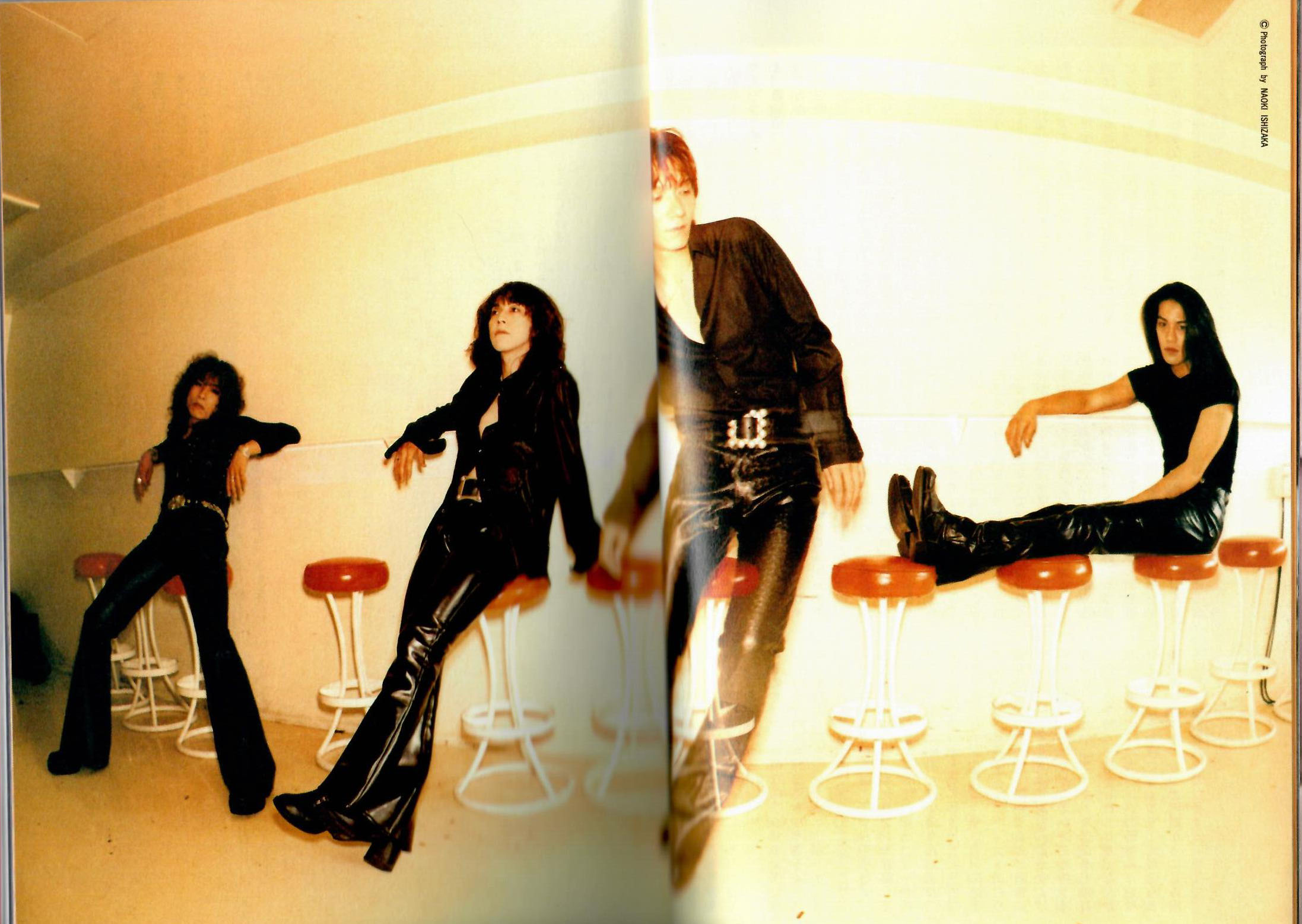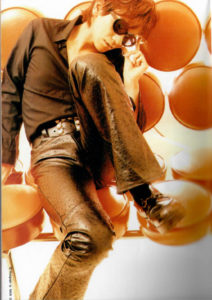
Interview: Youichirou Yamasaki
Photography: Naoki Ishizaka
(From Rockin’ On Japan Vol. 103, October 1995)
Kazuya Yoshii talks about the beginning of the hottest season for The Yellow Monkey in a very cool way. The Yellow Monkey is a declaration of real Japanese rock!
Having listened to the new album, the things you said in your previous interview…
(Yoshii) They weren’t complete lies, were they?
I definitely get the impression that your level just suddenly went up, with a big bang.
(Yoshii) Yeah. This album ended up being a lot of fun for me. During “Smile” I was still in this mode where I had to let things sink in. That’s why a lot of my own personal feelings were a part of those lyrics. But then I came around to wanting to make something a bit heavier and more pointed, so I had a lot of fun with this album.
You talk about the album so nonchalantly! (Laughs)
(Yoshii) I mean of course I think it’s a great album, personally speaking. For a band like us to make something like this given the current state of Japanese rock is really amazing…I’ve gotten a lot of complaints, from both fans and the media: That we’ve gotten arrogant, and that we’ve gone pop in order to sell albums. And I feel like smacking people who say those things in the head with a hammer. But we made it without thinking about all of that, and I feel like the album we made just organically came out to be really cool. We didn’t strain ourselves to make it.
I definitely get the impression that it’s a very organically and straightforwardly made album, from listening to it. Is that the first time things worked out this way?
(Yoshii) Yeah, I’d say so.
Were you worried about it at all?
(Yoshii) Not at all. I did exactly what I wanted to do for the last four albums…within a certain framework anyway. So I was very satisfied with all of those albums. The things that have changed the most from those is definitely the lyrics. Up until now, when it comes to lyrics…For example, let’s say I keep a dairy. I’m going to be embarrassed to let someone else read it, right? But I think that there’s someone else who really wants to read what’s in it, though I feel like it would be rude to just plop it down for them as is. I have this weird sense of needing to go over it a second time before I show them. But this time around I write in my diary in a way where I feel fine just showing it to someone else. And because this is music we’re talking about, if I just threw down a diary I’d be no better than some cheap troubadour. So that’s why I feel like the lyrics may be pretty different this time around. My dairy was good enough as it was. I was thinking about these things too much up until now, and being too greedy with them.
I see. Everything so far has been a concept or promotional sort of album. Were you worried about breaking away from all of that?
(Yoshii) No, I actually think that this is really the time we have to do that. I wasn’t worried about it at all.
Did that kind of energy just naturally come about?
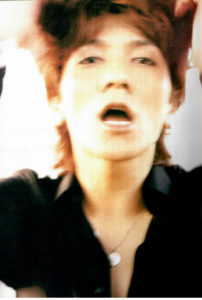
(Yoshii) Yeah, it did.
The first album was compiling songs and ideas from your indie days, the second was more strongly developing your song writing style. And you picked up some sort of weird or perverted aspects in making it.
(Yoshii) Right.
And so the next album, “Jaguar Hard Pain”, was a heavy concept album. Then the next one was “Smile”, an album that came from wondering what would happen if you wrote more mass-appealing pop songs. You’ve talked about exhausting all of the different angles from which you can make albums.
(Yoshii) I have.
In exhausting those different ways, what’s the biggest reason that you all thought “Forget all this, we’re just going to be honest with ourselves”?
(Yoshii) The biggest reason…this may just be for me personally, but doing that was really strangling the life out of the band. We were doing the things we wanted to do…like we made a concept album and did a year long tour for it…but the image of Jaguar was looming over all of that, and it gradually started strangling the life out of us as a band. So not being able to handle that is the biggest reason. I started writing lyrics when I was 23 and formed The Yellow Monkey. And I guess I had something of a complex where I wanted to sing in words that were different from the ones everyone else uses. Anyway, my desire for wanting to sing about weird things was very strong. And that’s all fine, but I don’t think those weird things really were written with the strength to be able to permeate people’s hearts. That may have been the case up through the second album, since I didn’t care too much about what the lyrics were up until that point. But I did put a lot of thought into the sound and music composition…and I think that’s because I didn’t listen to much Japanese rock. When I’d listen to western rock, the lyrics that came in the booklets would just be the translated versions, right? That’s why I didn’t think about them too much. And I finally found my own words and what I was thinking with Jaguar. I was able to express myself, but since it was a concept album it was in a very indirect way. They were words expressed in third-person, through Jaguar. While making “Smile” I didn’t really want to do that same kind of thing again. I wanted to write lyrics that were more superficial and easier to understand. Though I did think that as lyrics, they were maybe a bit lacking. So after all of that, I decided that I want to try scrapping it all and singing about what I’m actually thinking. To contradict myself a bit, I guess this is sort of a concept.
You said that you found the lyrics lacking on both “Jaguar” and “Smile”, but couldn’t you also say that’s what made them so cool?
(Yoshii) Right? I guess…it’s mostly younger people that listen to our music, right? I guess I’m a bit out of step with them! (Laughs)
Ha-ha-ha, what a thing to say!
(Yoshii) (Laughs) I really am though! I met Yumi Matsutoya on All Night Nippon, and she told me that I seemed like I was from the same generation that she was. That really surprised me! It made me completely realize that I’m really just an old man trying his best to get through to kids. I’m an old man in a younger person’s body. I really think about that quite a bit. Surprisingly though, I do think a lot of lyrics in some modern Japanese music are full of meaning. Rap groups like East End X Yuri, and things like that. I feel like they probably make younger people happy in a way that I can’t with my own lyrics. I don’t think I can write in a way that engenders those kinds of pheromones. I’m only 28, but I’m clearly an old man from the mid-Shouwa era! (Laughs) So in thinking that maybe I should try writing lyrics that an old-fashioned guy like that would write, it made those light and frivolous lyrics sort of disappear. The very kind that I was trying to bring in more of.
That’s very surprising to hear. The one aspect of The Yellow Monkey I’ve found lacking at points has been the lyrics, but fans of the band really love them. So I thought it was probably a matter of some fundamental differences in our viewpoints, but I’m very surprised to hear that you yourself had this same dilemma.
(Yoshii) Yeah. I really just didn’t have the skills, and that’s why I feel like “Four Seasons” is a very natural expression for me. I know that I have a bunch of different cartridges, and I’m confident that I can become many different types of people. But I’ve forgotten the most important cartridge somewhere along the way.
Ahh, I see.
(Yoshii) And then it was like I was putting in my spare cartridges, which were largely weird and useless ones, and turning on the power. The first time I really stopped and thought “When was the last time I put in my most important cartridge?” was definitely around “Jaguar”.
But those weird cartridges you mentioned…to not mince words, didn’t you saying “those kind of cheap and shady things are a rock band’s true nature” previously mean that those things were really valuable to you?
(Yoshii) Yeah. And that’s why I think there are plenty of people reading this who are thinking “But you’ve written plenty of great lyrics!”. I think so too, there have been some really cool phrases. But the truth is that I killed those phrases with other words, so they add up to nothing. If I have one or two songs that have really great lyrics, that many songs out of ten isn’t so great. Lately I’ve figured out how to write lyrics that I’ve been excited about from beginning to end.
Right. I’ve really felt that this time around, particularly with the first and last songs on the album.
(Yoshii) Some of the lyrics ended up being really embarrassing though. I thought they were really good lyrics when I was writing them, but afterward I thought “Boy these are embarrassing…I’m going to be exposed as a fraud!”
I see. From my point of view, singing “Bara Shoufu Reina” so enthusiastically is embarrassing, but…
(Yoshii) (Laughs)
I don’t feel that lyrics like the ones on this album are very embarrassing.
(Yoshii) Maybe not. I guess I’ve just built up an immunity to it at this point.
Have you gotten used to having more fun when writing?
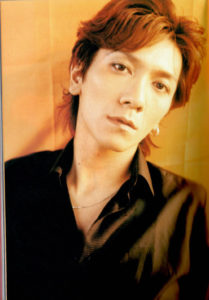
(Yoshii) I have. Having fun when writing definitely makes things less stressful, but it feels like that sense of security you feel when you go back to that one women for you. It was pretty embarrassing, but I thought it felt pretty mysterious when we got it recorded on the demos. And then it sounded really cool during playback. Most of that happened in England, and it really left me feeling like I found answers to some things in a situational way.
Well I think that most of the lyrics on the album are very cool.
(Yoshii) Yeah. I think I’ve grown to really like lyrics, and I suspect there will be some people who like seeing these interesting expressions lined up next to each other. With the way I am now I think I like my current lyrics better, but…well I definitely still think “Bara Shoufu Reina” is good! (Laughs)
I felt that you opened a new door somewhere right in the middle of yourself this time around.
(Yoshii) A long time ago, there was this feature in Rockin’ On Japan called “Magazine Battle”.
(Laughs) Yes, there was.
(Yoshii) When I talked to a fortune teller for that, she told me “Even though you have this sun that burns so brightly in your heart, you’re blocking it out with a bunch of different threads within yourself”, and that really startled me. While I feel that I have this really strong light within myself, I’ve always thought there was something preventing me from showing it. When we were recording the single “Taiyou ga Moeteiru”, I thought to myself “Ahh, I found those threads”. I think in an interview I gave when I was younger I said that it was because of trauma, or one of my parents, or something.
So are you saying you’ve actually been the type to have a sunny disposition this whole time?
(Yoshii) I think so. I’ve definitely never been the type of guy who keeps antique dolls in his house, or anything like that. Nowadays I’m probably the type to keep a punching bag there! (Laughs) Though there’s a part of me that thinks if I hadn’t come forward with that sunny disposition, the struggling aspect of me would have made me more popular with girls.
So it seems you’ve gone through some change, and to put it in a broader meaning…in terms of rock, I feel you’re coming at it with a positive energy that’s much different from before. How do you feel about that?
(Yoshii) Yeah…definitely. For example, I really like British rock that’s just slightly gloomy, but I also really like west coast style rock too.
You liar! (Laughs)
(Yoshii) It’s actually true. I listened to Bryan Adams and such a lot when I was 18! (Laughs)
(Laughs) Really?!
(Yoshii) I liked bands like KISS too, because I played rock that felt “explosive” when I was younger. I played in heavy metal bands, and when you start playing in bands like that in your teens and early twenties, you develop certain complexes as a musician. From there, there are people who make a radical change and go into soul, people who go into visual kei, people who go the opposite direction and get into something more popular…like the band Spiral Life. But it is true that I played heavy metal for awhile.
You could say that many Japanese bands have roots in heavy metal. They get it out of the way first! (Laughs) I guess Keigo Oyamada (Cornelius) and Spitz were both heavy metal at first.
(Yoshii) Right. Because for people in our generation, it was a genre that really caused a revolution. It was based around the theme of freeing yourself from everything. The heavy metal that I liked…well there are all different kinds of heavy metal, right? It can be more pop sounding, or more aggressive sounding. I liked the more captivating styles of heavy metal. If you trace my roots back keeping that in mind, I ended up at David Bowie. And there were all kinds of dark and brooding guys that were into him. So I guess I’m not the only one who had that particular sickness! (Laughs) Though back in the early days I wondered if it was just me who had it. And when we got signed I saw that all sorts of other people did too. Then I started to really dislike it, and tried to get it all out of my system with “Jaguar”. Grunge began in America right around the same time that heavy metal did in Japan, two styles of music with completely different roots right? Right around that time we thought that the music that these American “bad boys” were listening to was really cool. But we also thought that we shouldn’t imitate it, but rather see if there’s a way we could do it that was more our own. And we wrote it not caring much about whether it was heavy metal, or whatever. “I Love You Baby” is kind of my own ideal version of heavy metal. And in putting my own real words to it, I feel like it makes it not really heavy metal anymore.
What made you want to go back to your roots once again, in terms of sound?
(Yoshii) In terms of musical genres, I feel like that’s all very close to something like “Jaguar”. I actually very much had grunge in mind when writing that album.
Right, it has some very manly songs on it.
(Yoshii) Right, but the theme is quite feminine! (Laughs) I knew that the first thing I had to do was quit doing that. Since I’m involved in the music scene, I hear a lot of CDs from Japanese artists. And when I hear them, I find that there’s surprisingly few artists who play rock that sounds exciting. I find myself thinking things like “What year is this arrangement from?!” or “What part exactly did they decide to take away from listening to Phil Spector?”. I really like things that come naturally from somewhere deep inside, and so I thought it might make the current Japanese rock scene a bit more interesting to show them The Yellow Monkey playing it straight. Incredibly straight, this time.
Do you think that by doing that, you’ve made a type of hard rock that only the four of you can?
(Yoshii) Yeah. It’s hard rock, but it’s also something new.
It’s not hard rock done for the sake of playing hard rock, it’s hard rock that came out as the result of all of you resonating together in a very straightforward way.
(Yoshii) We surprisingly haven’t shown our roots as a band much in this way, up until now. I’m the band’s leader, and so the other members have gone along with my ideas. But this time we really wanted to show who The Yellow Monkey was as a band, again.
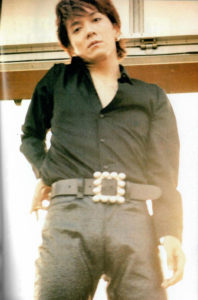
Just what was it that made you want to return to your roots and be more straightforward, in terms of lyrics and sound?
(Yoshii) I wonder…the band has come to be pretty well known these days. In an interview I gave a really long time ago, I said all kinds of odd things about “wanting to put a condom on Tokyo Tower”…and I still do want to do things like that. And maybe it’s time to take the first step toward that. The desire to is the strongest thing for me right now.
I see. Are there any other reasons?
(Yoshii) I…don’t really think so. It’s just because the band has gotten bigger.
If you hadn’t become more popular as a band, would you still be making a series of concept albums? (Laughs)
(Yoshii) (Laughs) I wonder if I would be…(Laughs) I don’t think so though. Maybe I’d be making more straightforward ones like we are now…? I think I would be! (Laughs)
I think you have a favorable wind at your backs with the band having gotten more popular and recognized, but I don’t think it’s just because of that favorable wind.
(Yoshii) Hmm…I wonder why it happened? When you put it like that, I’m not really sure…but what I do know is that I’ve grown to want to sing about more powerful things.
Right. I get the feeling that you’ve found something big within yourself.
(Yoshii) Yeah, yeah…I’m not sure what…but I probably did have that kind of moment. Things that I’ve really liked up until now…I hadn’t really read any Ranpo Edogawa books, for example…but I got really interested in reading some. Now that interest is completely gone. I guess this is just a time in which I’ve grown to dislike that kind of stuff…though it might have something to do with me having started fishing (Laughs)
(Laughs) Come on, you’re not Tamio Okuda!
(Yoshii) (Laughs) No, no. But he’s probably talked about how into it he is too.
He sure has! (Laughs) He’s said that “it’s very important to him”.
(Yoshii) It is to me too. You start to feel that way when you get closer to nature. That’s why I haven’t really had any lyrics about the sky, ocean, or rivers up until now. I really avoided the ocean before, but now I feel closer to it. It’s like I’ve started thinking about it as something of a place that people should return to, or something like that. Fishing is a really big part of that, for me. It’s the same thing as hunting, in a way. And doing that…well my mental state right now is pretty close to what it was when I was in middle school: Loving the sun, and just simple. And well…I’ve hardly ever been satisfied with the songs on the albums that we’ve released so far. It’s embarrassing to admit, but a song that I end up revising shows it in terms of emotions when I sing it. The song that I’ve been the most satisfied with is “Silk Scarf ni Boushi no Madam”. It was the song that inspired me to write the song “Four Seasons”, as I realized all over again that it was a direction that I could go in. I was always conflicted over not being able to sing songs like this in my own words, without pretending to be a character. This time I finally decided that I’m able to do it, and when I did I also realized that this song is still a part of me, even normally. For instance, there was a time when I would have just re-recorded the song if I didn’t like the way I sounded because it was too childish, or too gentle, or whatever. That’s definitely something that I’ve fought with myself about. And I knew that really singing means singing through tears when you want to cry, and such. But I guess I couldn’t really do that. All kinds of noise would get in the recording, and I’d give in to it. I was very weak. But this time I took more of a stance of “Noise? Fuck off!”. And whoever doesn’t like it can go. 10 people may leave, but 10,000 new ones will come. It’s not a sound that I’m lying to anyone about, and I think it’s a very cool one that comes from the bottom of my heart. So I welcome those 10,000 new people with open arms. Sorry, but I’ve just been lying to everyone up until now.
In the last interview you said “We really are a new band”, and I actually did think “They’re just saying that” (Laughs) But this time it actually does feel that way.
(Yoshii) (Laughs)
To put it a different way: You’ve put out good stuff, but it always felt like the best was yet to come.
(Yoshii) I apologize. (Laughs)
(Laughs)
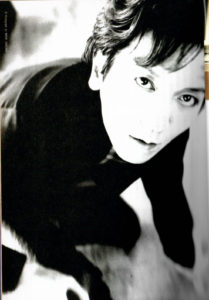
(Yoshii) I definitely got the OK from my own internal judgement on this one. I feel like people tend not to change in the way that they think. But even so I still thought “If I show this side of myself, people won’t think I’m cool”.
Why!?
(Yoshii) I’m not really sure! (Laughs) It’s probably because the rock stars that influenced me did it this way, or this is the kind of artist I want to be. It’s like how people always pick the photos of themselves where their faces don’t quite look like themselves. Because they’re able to see something in them that’s different from their normal selves. That’s why it particularly hits home for me when someone tells me “That photo really does look like you”.
So that’s why in the title track “Four Seasons”…I’m going to read some lyrics aloud here…
(Yoshii) It’s fine! (Laughs)
“A beautiful season full of hope is drawing near. But I’m not brave enough, not strong enough, don’t have enough time. I don’t have enough money, enough air, enough life. So I’m going to break it all apart, because there’s not enough of anything. I’m going to break it all apart, because I want it all.” I wonder why you didn’t write anything like this before now, this is great.
(Yoshii) Well you know…I have a ton of Muji brand notebooks at home…
So Kazuya Yoshii shops at Muji! (Laughs)
(Yoshii) No, it’s just that they were cheap! (Laughs) I started using them around our second album, so I have a ton of them lying around. They’re all full of lyrics, but most of them are different from the kind of lyrics that end up on the current album we’re working on. I took another look back at what I had written down from around the time of “Jaguar”, and they were themed in the exact same way as the lyrics on this album were.
So then you were actually hiding something?
(Yoshii) Yeah. For starters, I didn’t really have the technique to write popular Japanese music. That was a dilemma I was always struggling with: I didn’t much care for the overly honest songs that made up most of Japanese popular music, and I had a really strong desire to make mine sound more western. I didn’t get it purely from example, but my approach was mostly doing it in my own way, like Keisuke Kuwata does. And that old stuff is definitely interesting to listen to. It’s interesting, but it’s not very good. It’s not particularly moving. But back then I had more of a stance that it was fine if it wasn’t moving, as long as it was interesting. And this time around we’ve finally come to understand what our particular brand of rock is.
I don’t think it was ever a matter of technique. I think it was a matter of courage.
(Yoshii) I think you’re probably right. And that’s why I didn’t have any.
But I think seeing the faces and sheer number of the fans at the Budokan ignited that courage within you.
(Yoshii) So you DO get it then! (Laughs)
And so that’s why I wondered why you’d never written anything like “I want to fly so beautifully through the sky. Spreading these wings of good and evil, I want to give you a wink” before.
(Yoshii) (Laughs) It’s a coward just sitting there on the bungee jumping platform! (Laughs) But then it felt really great when he finally took the jump, and got totally addicted to the feeling.
I feel really good about the ground that The Yellow Monkey’s standing on right now. You’re really leaving behind everything that you were known for up until now.
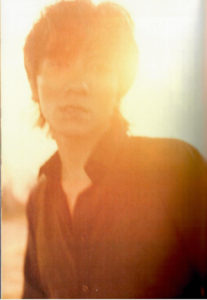
(Yoshii) Yeah. And I really feel that with this album I was finally able to convey the songs that I want to sing. I wrote songs with all sorts of phrases and themes, and I really used different sorts of words than usual to try to convey what I wanted to get through on this new album. And the things I want to sing about haven’t changed at all. I was often told that we were a very dazzling band, but I feel like that’s just saying we had a cheap plastic feeling. It seems like a fine thing to say on the surface, but it’s kind of the same thing as calling a bad punk band “still developing”. That’s something aimed toward artists that present themselves as seeming too frail to even take the first step, right? It just feels really cheap, or really sad. I really hated being described that way.
And that’s why you were the way you were.
(Yoshii) And I think it was because I was bad at expressing myself. I dressed up in women’s clothes, but that’s not the kind of woman that I imagined myself as when I did that. I imagined myself as a woman that was more gorgeous, more severe, and one that seemed more human. What I ended up being was a character that was something slightly evolved from visual kei.
You just said something really cool.
(Yoshii) No, I really thought that. I had no real strength or courage, even though I was giving it my all. But the truth is that I was doing it all in a way that was like saying “Just come on and fuck me already”. I suppose I did have a lot of female fans that felt very motherly toward me, and I’m still grateful for them. But I think that people on the same wavelength as me will be very happy with this album. They’ll say “He finally made it! He finally found his courage!”. If they read me giving these kinds of interviews, they might not listen to any of our older stuff though! (Laughs)
(Laughs)
(Yoshii) Eh, it’s fine. Well, I guess you could say that I felt having a desire to have a good time was required, but I didn’t know how to actually do it.
I know what you mean. How do you think this album will be received when it comes out?
(Yoshii) Hmm…I talked about this in the last interview and I really took some heat for it. I got a lot of objections from them on this (Laughs), but I think that for every 10 air-headed women fans we lose, we’ll gain 10 new fans that have real human emotions. I just think that’s how it will be. And so when it comes to women specifically, we’ll be getting much better ones. When it comes to men, I think more of them will be refined and manly.
But there aren’t many bands that are really selling with this kind of a straight rock sound right now. Only visual kei bands and like…Tamio Okuda.
(Yoshii) That’s true. That’s really…a lot of bands have been breaking up lately. I really see a lot of the bands around us as rivals, and I often think “Screw you, I’m not losing to you!”. But that said, there are aspects to it that I really value. I’ve thought for a long time that there needs to be more really cool rock bands in Japan that are signed to labels, and bands like that are just gradually disappearing. Like The Blue Hearts. It makes me feel lonely: If things keep up like this, rock will gradually die out and a weird new version of it will come out from that. I feel that we’re a rock band with a very unique Japanese style. The feeling of us being the pillar that’s holding up Japanese rock right now is really strong within me.
That really comes out in this album. I felt that disposition of needing to make it have an unapologetic rock sound.
(Yoshii) I felt that very strongly. I’ve been saying everywhere that I want our albums to sell, and I’ve been told by many different people to not be so desperate and stop talking about that already. And I’ve really wanted to point out to them that’s not what I mean! “The sound that you think will sell is different from the one that I think will, so just shut up and watch!” is the disposition that I had when making the album.
Another thing on my mind is that I think it feels very good to see you being so straight forward. The Yellow Monkey has seen themselves as victims, and have been a band that was presenting themselves as having been beaten down.
(Yoshii) Right, right.
And even though you’ve had that feeling of being victimized for awhile, you were kind of taking the presentation of all of that into yourself. For example, even in interviews you needed to talk about how much damage you’ve suffered.
(Yoshii) Right.
But on this album you’re not playing the victim anymore. Though you are singing about being victimized…I wonder what brought about that change?
(Yoshii) Hmm…
But it’s not like you just suddenly turned into a winner on this album.
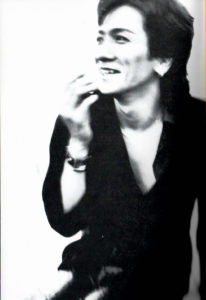
(Yoshii) Yeah, and there’s no real attacker…hmm…You know, ever since I was a kid I’ve thought about lyrics as needing to have a victim. Because rock has always been the thing that really encouraged me when I was feeling weak, worried, or depressed. So whether the theme of the lyrics involved a prostitute or a soldier that died in war, it was always a very big thing to me. This time around the lyrics feel more like Motown or something, and I apologize to all the black folks out there for that comparison. “Things are depressing and there’s trouble, but let’s just forget about all that. Let’s just live our lives”. I’m not really sure why, but I really wanted to sing songs about just living, since we’re all living our own lives here and now.
That’s a very heavy theme.
(Yoshii) I’ve been too embarrassed to sing about just living life up so far. But I had to sing about being a victim, so the themes in my lyrics were always about my own experiences during childhood or with love. But now I feel like I have to sing songs that say stuff like “I’m a victim, and you all might be victims too. But none of us can help it, so let’s just live our lives”.
So then you’re saying that it wasn’t necessary for you to take measures to amp up those feelings of victimization.
(Yoshii) It wasn’t, because it’s obvious that I feel that way. Singing songs about living feels better to me right now than singing ones about dying. And my friends…well you know how many songs I’ve sung about war. Friends have told me “You don’t really need to sing songs about war anymore, do you? You should sing songs that will make everyone that listens to them feel peaceful”. Everyone around me, whether it’s our director or the staff members, says things like “You don’t divide up the moon. It’s round, so everyone just looks at it and feels relieved”. The people that surround me are all very strong. It makes me feel that I have to look at reality without running away from it, and there’s just no need to be sad about it anymore. I’m still singing about men and women, just like I always do, but it’s in a completely different way. It’s a strange new thing even for me.
Well then, one last thing. It’s harder for modern rock bands to have a sense of purpose compared to older ones. For many older ones, it may have been something like “I want to play guitar like a westerner”.
(Yoshii) Yeah.
It was easy to have a purpose like “We’re going to find the truth”. But rock bands now know they can’t really do something like that, and they know that even if they can play guitar like a westerner it’s not really that big of a deal anymore. They don’t know what their purpose should be, so they go back to soul or go off in search of the next big thing in techno, or something like that. That’s just the time period we’re in right now. I’d like for you to talk about the large sense of purpose you have for playing rock, amidst all of that.
(Yoshii) ….Well, we’re playing rock in Japan, and I have a very specific image of what being Japanese is. There are times when I lose sight of it, like watching TV and such…Recording in England for this album was the first time I was out of the country for half a month. And I noticed that English people bask in rock like it’s a blessing from god. There really isn’t any rock like that in Japan. For English people, there’s actually rock that’s very impactful. But in current day Japan, it doesn’t feel like there’s very much of that at all. That’s a theme that’s always floating around within me. “We don’t need to be like western countries: Drugs aren’t all that widely used here, and there aren’t really any shootings. Murders in general are fairly infrequent. All we really do is let weird religions thrive”. And I think that’s down to race. There’s a distinct lack of rock that resonates in the hearts of Japanese people. Actually there is some, but those bands tend not to be ones that are signed to major record labels. The messages sent by modern popular music here are weird ones, and I want to do something about that. But things are still pretty bad regardless. And though that’s how I’ve felt, the policies…(Laughs) or rather the planning to achieve that was pretty much nonexistent. I had the dilemma of feeling that way, but not being able to create anything to help fix it. But I wrote this album with the intention of doing just that. Even though this all really started with “Jaguar”.
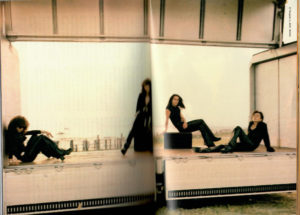
But…instead of calling it rock that you bask in, isn’t it more like someone with strong sexual desires reaching their hand out…
(Yoshii) It felt like going to drink water from a spring.
Right, right. And you just want to help it fall more like rain, right?
(Yoshii) Yeah. I want to make something that will make people think “Wow, this feels great!” when the rain suddenly falls after they’ve been covered in mud for so long.
